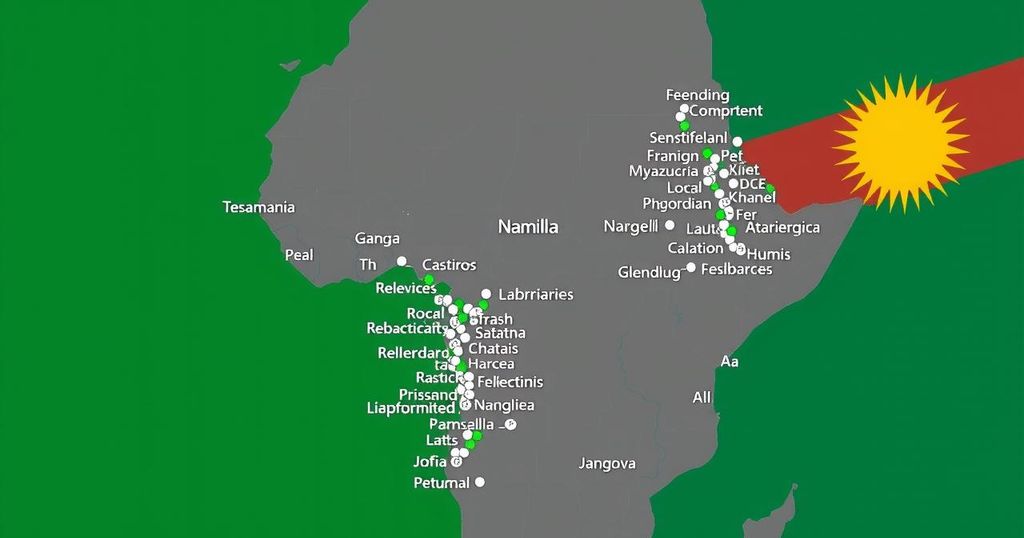Namibia will conduct elections on Wednesday, presenting a significant challenge for SWAPO, historically dominant since independence in 1990, due to rising public dissatisfaction. High unemployment, corruption, and a youthful electorate seeking change could drastically alter the political landscape. The outcome may lead to the election of Namibia’s first female president or mark a major shift in governance. Stakeholders anticipate the results within five days, with implications for liberation parties across Africa.
On Wednesday, Namibian voters will assess the viability of the South West Africa People’s Organization (SWAPO) during what many consider to be the most formidable electoral challenge the party has faced since independence in 1990. Unemployment levels soar, governmental corruption persists, and discontent regarding social conditions is prevalent, thus adversely impacting SWAPO’s popularity. The results of this election may indicate a broader trend across southern Africa, where liberation parties are increasingly losing favor among a youthful electorate seeking immediate economic improvements over historical narratives of liberation.
The electoral landscape is further complicated by rising youth participation; over 40 percent of registered voters in Namibia are aged 35 or younger. This demographic shift reveals a growing disinterest among younger voters in the narratives used by established political entities, as they prioritize current socioeconomic conditions over past struggles. Oscar Van Heerden, a political analyst, remarked that, “The euphoria of liberation movements is rapidly disappearing among the Gen Z generation,” reflecting this sentiment. However, encouraging youth engagement in politics presents challenges, as many young people are less likely to vote despite registering.
The economic environment continues to worsen, with significant housing shortages and unemployment rates estimated to reach one-third of the population. These conditions have led to public disillusionment regarding the government’s ability to administer land ownership reforms, which remain concentrated among the politically affluent. Political observers believe that SWAPO may still retain its dominance due to the presence of numerous opposition candidates, which could dilute the vote, benefiting SWAPO. Moreover, the party’s historical stronghold in rural areas demonstrates continued support when coupled with substantial rallies.
Notably, the upcoming election not only presents an opportunity to reaffirm SWAPO’s power but also marks a historical moment whereby Namibia could elect its first female president, Netumbo Nandi-Ndaitwah. In contrast, the main opposing candidate, Panduleni Itula, represents a newly formed party infused with former SWAPO sentiments. If no candidate secures a majority, a runoff will ensue—an occurrence unprecedented in Namibian elections.
As the political dynamics evolve, all eyes will be on the election outcomes, expected within five days following the polls—either solidifying SWAPO’s legacy or indicating a decisive shift in Namibia’s governmental landscape. The implications are significant and will resonate throughout the region, as this election could reshape perceptions of liberation parties in Africa.
Namibia’s political landscape has been historically dominated by parties that emerged from liberation movements, particularly SWAPO, which has governed since independence in 1990. Across southern Africa, similar parties have experienced electoral setbacks in recent years, creating a context of heightened scrutiny for SWAPO as public dissatisfaction grows due to economic hardships, government corruption, and inadequate social services. As younger populations come into voting age, their priorities are increasingly diverging from the historical narratives that once rallied support for these parties, posing a challenge for their traditional bases and leading to a re-evaluation of the political foundations established during the liberation struggles.
The upcoming election in Namibia represents a critical juncture for the SWAPO party, possibly affecting its long-standing dominance amidst growing public dissatisfaction and the emergence of a politically active youth demographic. As electoral strategies adapt to contemporary socioeconomic challenges, the outcome will not merely reflect SWAPO’s resilience but could set a precedent for future governance across southern Africa. With historical implications at stake, the election is poised to define a new political narrative for the region.
Original Source: www.nytimes.com






